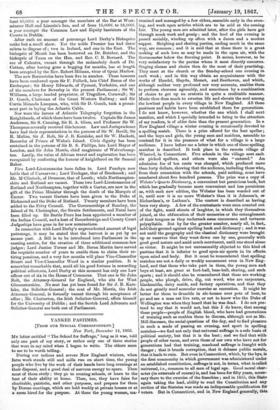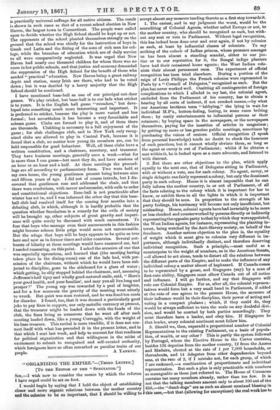YANKEE PASTIMES.
[FROM OUR SPECIAL CORRESPONDENT.]
New York, December 14, 1866. MY letter entitled "The School for Suffrage," long as it was, told only one part of ray story, or rather only one of three stories that were in my mind when I began to write. The others seem to me to be worth telling.
• During our tedious and severe New England winters, when farm work stands still and mills run on short time, the young people who live by the work of their hands have long evenings at their disposal, and a good deal of nervous energy to spare. Then most of them study ; they go to evening schools, or learn to the beat of their ability at home. Then, too, they have fairs for charitable, patriotic, and other purposes, and prepare for them by Dorcas meetings, which are held weekly at private houses or at a room hired for the purpose. At these the young women, ma- tronized and managed by a few elders, assemble early in the even- ing, and work upon articles which are to be sold at the coming fair. The young men are admitted later, after the girls have got through much work and gossip ; and the heel of the evening is passed sociably, winding up often with a dance and a modest supper. Sleighing and skating parties, ending much in the same way, are common ; and it is said that at these there is a great making of such love as may be made in the open air, with the thermometer below the freezing point. It seems, however, to be very satisfactory to the parties whom it most directly concerns.. Singing classes and choirs then do the most of their practising They meet at the church or the Sunday-school one evening in each week ; and in this way obtain an acquaintance with the works of llaudel, Haydn, Mozart, and Beethoven, and which, although neither very profound nor very accurate, enables them to perform choruses agreeably, and sometimes by a combination of choirs to get up an oratorio in quite a creditable manner.. Music thus does much to sweeten life and elevate the soul among the lowliest people in every village in New England. All these- pastimes and habits have been established there for generations. I do not know, however, whether the one which I shall next mention, and which I specially intended to bring to the attention of my readers, is of older date than the present generation. In a New England village a winter evening is occasionally devoted to a spelling match. There is a prize offered for the best speller ; and the boys and girls, the young men and maidens, assemble to. contend for it in the presence of what for a village is a large audience. I have before me a letter in which one of these spelling matches is described. It took place in the remote village of Winsted, in Connecticut. Five schools in the village sent each, six picked spellers, and others were also "entered." Ar. admission fee of ten cents was charged, which produced more than forty dollars, showing that the audience, including those who,. from their connection with the schools, paid nothing, must have numbered about five hundred persons. The prize was a copy of TVebster's Quarto Dictionary, a convenient but pernicious book, but which has gradually become more convenient and less pernicious. as, with each new edition, the Webster has been weeded out of it, until now it is no more Webster's than it is Johnson's, or Itichardson's, or Latham's. The contest is described as having been very sharp. A few of the contestants were soon counted out of the fight, amid shouts of laughter, in which they themselves. joined, at the obfuscation of their memories or the entanglement. of their tongues as they undertook some uncommon and tortuous polysyllable. But by far the greater number, nearly all, in fact,. held their ground against spelling book and dictionary ; and it was. not until the geography and the classical dictionary were brought up as reserves that they went down one by one, generally with good good nature and amid much merriment, until one stood alone as victor. It might be not unreasonably objected to this kind of pastime that it is inferior to good open-air sports in its effects. upon mind and body. But it must be remembered that spelling matches are not a daily or weekly amusement even in New Eng- land, and that those who take part in them, the young men and boys at least, are great at foot-ball, base-ball, skating, and such sports ; and it should also be remembered that these are working people, who plough, drive, dig, cut wood, who are carpenters„ blacksmiths, dairy maids, and factory operatives, and that they do not greatly need muscular exercise as recreation. It might be- better for them to drumble in ale-houses over pots of beer, to go and see a man eat live rats, or not to know who the Duke of Wellington was when they heard that he was dead. I do not pre- tend to say that it would not, but this I do know, that among these people—people of English blood, who have had generations- of training such as enables them to discuss, although not as Mr. Mill discusses, the social questions of the day, and to find pleasure. in such a mode of passing an evening, and sport in spelling matches—we find not only that universal suffrage is a safe basis of political society, but that it is the best ; and we find that with people of other races, and even those of our own who have not for generations had that training, manhood suffrage is fraught with danger ; that it breeds corruption, that it debases public morals,. that it leads to ruin. But even in Connecticut, which, by the bye, is the first community in which government was administered under an established constitution, suffrage is not, in terms, what is called universal, i.e., common to all men of legal age. Good moral char- acter (in externals of course) is, and has been for fifty years, neces- sary there to the exercise of the franchise ; and in 1853, this State again taking the lead, ability to read the Constitution and any section of the Statutes was made an indispensable qualification for • voters. But in Connecticut, and in New England generally, this
is practically universal suffrage for all native citizens. The result is shown in such cases as that of a recent school election in New Haven, the largest town in Connecticut. The people were called upon to decide whether the High School should be kept up or not. The opponents of the school planted themselves strongly on the ground that the school was chiefly for the instruction of boys in Greek and Latin and the fitting of the sons of rich men for col- lege, while the branches of education which are of daily service to all were comparatively neglected. It was urged that New Haven had nearly one thousand children for whom there was no room in her public schools, and that justice and economy demanded the suppression of the High School for the benefit of those who needed "practical " education. New Haven being a great railway depot and station, many Irish are there, who had to be voted down ; but it was decided by a heavy majority that the High School should be continued.
I have mentioned base-ball as one of our principal out-door games. We play cricket, but base-ball is to our lads what cricket is to yours. It is the English ball game "rounders," but deve- loped into something much more interesting and important. It is preferred to cricket, because the play is more varied and less formal ; but nevertheless it has become a very formidable and solemn game. Clubs are formed to play it, and of these there are thousands. Clubbing is necessary to a full enjoyment of the game ; for club challenges club, and in New York only recog- nized clubs are allowed to play in Central Park, because it is found that a club, no matter how young its members are, can be held responsible for good behaviour. Well, all these clubs have a written constitution, and a chairman, secretary, and treasurer. They have business meetings, generally once a week—what for is more than I can guess—but meet they do, and have sessions of an hour or an hour and a half. At these meetings the proceed- ings are all according to parliamentary form. Two were held at my own house, the young gentlemen present being between nine and fifteen years of age. I did not of course intrude, but I dis- covered that gentlemen rose and addressed the chair, and that there were resolutions, with mover and seconder, with calls to order and constitutional objections. Base-ball is not practicable after winter has set in, and I was informed the other day that this base- ball club had resolved itself for the coming four months into a debating club, in which, although it is hardly probable that the question whether Secularism is a remedy for the evils of society will be brought up, other subjects of great gravity and import- ance will quite surely be discussed with much earnestness. To fear that boys who manage even their amusements in this fashion might become solemn little prigs would seem not unreasonable. But the adage that boys will be boys appears to be quite as true here and now as in former times and older countries. Several out- bursts of hilarity at these meetings would have reassured me, had I needed reassuring, on this point. I asked the occasion of one that was especially uproarious, and learned that (the meettng having taken place in the dining-room) one of the lads had, with per- mission of the chairman, without which he would have been sub- jected to discipline, gone to the sideboard for a glass of water ; which getting, he slily stepped behind the chairman, and, assuming Jeffre,son's half tipsy and wholly good-natured smile, said, "Here's your good health, and your families', and may you all live long and prosper !" 'fhe young rep was rewarded by a peal of laughter, and for a few moments the gravity of the meeting went utterly to wreck. But quiet was soon restored, and he was fined ten cents for disorder. Pfound, too, that it was deemed a particularly good joke to pay fines in coppers, our only metallic currency at present, that the treasurer might be loaded down with the funds of the club, the fines being so numerous that he went off after each meeting loaded down, like a young Correggio, with the weight of his base treasure. This recital is mere twaddle, if it does not con- nect itself with what has preceded it in the present letter, and in that which I sent last week, and help to account for that readiness for political organization and that willingness in the midst of excitement to submit to recognized and self-created authority, which foreigners have so often remarked as peculiar traits of our































 Previous page
Previous page